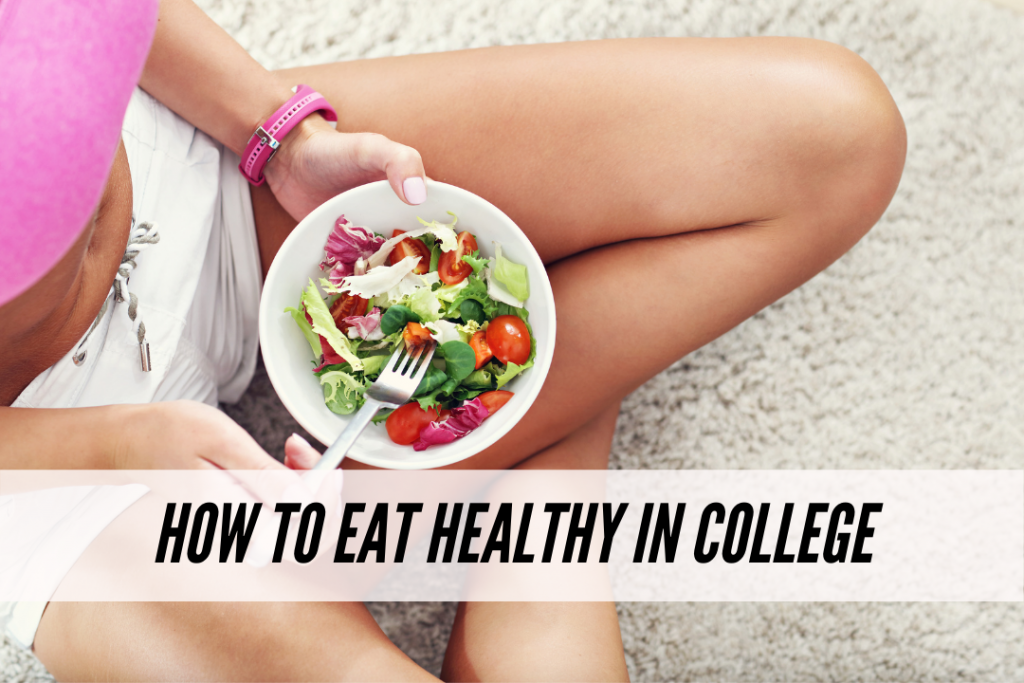
When entering college, we all hear about the dreaded “freshman fifteen” (the 15 pounds everyone supposedly gains during their first year).
Much of this can be attributed to the fact that junk food is everywhere in college, from all-you-can-eat dining halls to delivery services that bring meat lover’s pizza at all hours.
Indeed, it’s very easy to develop unhealthy eating habits in college.
All that said, it is possible to eat well in college, and what’s even better is that it’s much easier than you think. With a little effort, you can eat healthily without making too many sacrifices. Here are my tips for maintaining an overall healthy diet in college:
Table of Contents
1. Reduce the number of times you eat out per week.

I get it, college can be time-consuming and stressful, so a quick take-out order or drive through pick-up can seem like a lifesaver. The problem with this is that you almost always sacrifice health when you allow a restaurant to cook your meal. We all know fast food is bad for us, but takeout isn’t better: In fact, studies have suggested that restaurant takeout food may be LESS healthy than fast food!
Take a steak, for example: It’s not terrible for you, providing you don’t eat it for every meal, but when you order a steak in a restaurant, it is almost always coated in loads of butter – much more than you’d add if you were cooking it yourself. If you were to cook that same steak at home, you could easily get a healthier meal by simply using a small amount of butter or oil and seasoning it with salt and pepper.
Basically, if you have access to a kitchen, either on your dorm floor or in your apartment, use it as much as possible. You will almost always get a healthier meal when you cook for yourself as opposed to ordering out.
If you don’t have access to a kitchen, try to choose options in your cafeteria that are on the more nutritious side. For example, try some baked chicken and brown rice with a side of vegetables instead of your usual heaping plate of mac and cheese. Just as filling and way better for your body.
2. Remember moderation.

In connection to my first point, you need to remember moderation. It’s okay to go out to eat every once in a while – I’m not saying you should never get takeout or that you should avoid fun nights out with friends. The key is to cook for yourself the majority of the time and view restaurant meals and takeout as the special treats they are.
Moderation also applies to what you eat. If you want buttery mac and cheese, then have it, but maybe think about going heavier on the veggies at your next meal. A healthy diet is all about balance.
You don’t have to compromise on the foods you love just because you want to eat healthy. It’s even okay to have days where you forgo healthy eating entirely and enjoy a bunch of your favorite junk foods – we all do it! After days like this, all you have to do is try to make healthier choices in the following days. Like I said, balance.
Don’t be too hard on yourself. Life is too short not to eat what you love; you just have to do so in a sensible way.
3. Eat on smaller plates.
This is a trick many people forget about, but is great if you struggle with portion control.
When loading your plate, either at home or in your dining hall, use a small side or salad plate as your main plate. Many times our eyes are bigger than our stomachs and we take more food than we can comfortably eat, only finishing it because we feel guilty for taking so much.
You can always go back and get more food when you’re done with your small plate, but by doing this trick, you’re giving yourself more time to evaluate if you’re truly still hungry or not.
4. Eat smaller meals, more often.

Snacking can actually be great for you if done correctly. By eating small meals continuously throughout the day, you never get ravenously hungry. Allowing yourself to become ravenous can oftentimes lead to gorging on whatever’s available instead of making healthy choices.
Healthy snacking obviously doesn’t mean munching on potato chips and brownies all day. Instead, choose nutrient-rich foods like nuts, berries, and vegetables with hummus.
Here at CF, we have tons of articles on how to snack the healthy way. One of my favorite articles is this one, which features snacks that are easily portable for those of us who are always on-the-go.
This article even highlights the healthier options at vending machines, so you can make smarter choices.
How do you make healthy eating part of your lifestyle in college?
Ultimately, staying healthy in college isn’t as hard as everyone says. The most important thing is to listen to your body, because no one knows your body better than you. With practice, healthy eating will become second nature and your body will feel fantastic.
Are their any other tips that you guys have to maintain healthy lifestyles in college? Any awesome recipes you want to share? Let me know in the comments.
